Abstract
This article is a response to Clifford Williams’s claim that the debate between A- and B theories of time is misconceived because these theories do not differ. I provide some missing support for Williams’s claim that the B-theory includes transition, by arguing that representative B-theoretic explanations for why we experience time as passing (even though it does not) are inherently unstable. I then argue that, contra Williams, it does not follow that there is nothing at stake in the A- versus B debate.
Similar content being viewed by others
Notes
‘Why the A- versus B-debate is not About Whether Time Passes’ (unpublished).
This defense of my view of the B-theory is independent of, and supplementary to, that provided in ‘Why the A- versus B-debate is not About Whether Time Passes’.
References
Burley, M. (2006). Beyond “Beyond A- and B-time”. Philosophia, 34.
Falk, A. (2003). Time plus the Whoosh and Whiz. In Jokic, A. and Smith, Q. (Eds.), Time, Tense, and Reference. MIT; see also Falk, A., Darwinism and Philosophical Analysis, Decent Books, New Delhi, 2003.
Le Poidevin, R. (2007). The images of time: an essay on temporal representation. Oxford University Press.
Mellor, D. H. (1998a). Real time II. Routledge.
Mellor, D. H. (2000). The time of our lives. In: O’Hear, A. (Ed.), Philosophy at the New Millennium. Royal Institute of Philosophy Supplements 48.
Mellor, D. H., Lucas, J. R. (1998b). Transcendental Tense, Aristotelian Society Supplementary Volume.
Oaklander, N. (1993). On the experience of tenseless time. Journal of Philosophical Research 18; also repr. in Oaklander 2004.
Oaklander, N. (2004). The ontology of time. Prometheus Books.
Paul, L. (2010). Temporal experience. Journal of Philosophy.
Savitt, S. (2002). On absolute becoming and the myth of passage. In Callender, C. (Ed.), Time, reality and experience. Cambridge University Press.
Williams, C. (1996). The metaphysics of A- and B-time. Philosophical Quarterly, 46.
Williams, C. (1998a). B-time transition. Philosophical Inquiry, 20.
Williams, C. (1998b). A Bergsonian approach to A- and B-time. Philosophia, 73.
Williams, C. (2003). Beyond A- and B-time. Philosophia, 31.
Zimmerman, D. (ed.) (2004). Oxford studies in metaphysics, Vol. 1. Oxford University Press.
Zimmerman, D. (2005). The A-theory of time, the B-theory of time, and “taking tense seriously”. Dialectica, 59.
Acknowledgement
I am indebted to Oliver Pooley for extensive discussion of these issues.
Author information
Authors and Affiliations
Corresponding author
Rights and permissions
About this article
Cite this article
Deng, N. ‘Beyond A- and B-Time’ Reconsidered. Philosophia 38, 741–753 (2010). https://doi.org/10.1007/s11406-010-9257-6
Received:
Accepted:
Published:
Issue Date:
DOI: https://doi.org/10.1007/s11406-010-9257-6




